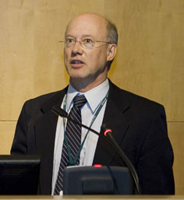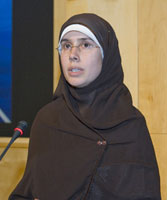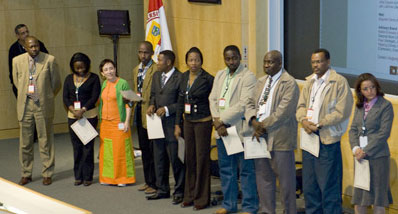Science journalists have a vital role in explaining science and research to the general public – yet their efforts tend to be undervalued by media editors and scientists alike.
This was among the topics discussed at a workshop in Education City, Doha run by the World Federation of Science Journalists (WFSJ) for African and Middle Eastern journalists, February 4-9. The co-sponsors were Qatar Foundation and Al Jazeera Network.
The opening ceremony, hosted by WCMC-Q, saw the launch of the Federation’s on-line training course for science journalists. Available in English, Arabic and French, it is part of an ongoing effort to reach out to writers and broadcasters in the developing world.

Coverage of science in the media
contributes to "a better public
debate" - Jean Marc Fleury.
In the developing world, the situation is more precarious. In response, the WFSJ, a non-governmental organization, set up the Science Journalism Cooperation (SjCOOP) project in 2006. It provides mostly distance mentoring by experienced journalists for colleagues in Africa and the Middle East, with support from development agencies in Canada, Sweden and the UK.
“For many years, the agencies have been funding the work of scientific researchers throughout Africa and in many Middle Eastern countries,” Fleury explained. “Their hope is that there will be journalists of a caliber to interview the scientists, so the ideas and the results of the research are in the media – contributing to a better public debate.”

Dr. Nadia El Awady:
Enhancing Arab science
journalists' confidence and
skills is a priority.
Physician and founding president of the Arab Science Journalists Association (ASJA), Dr. Nadia El Awady, who writes for IslamOnline.net (English), said: “I see things changing. When we started, I don’t think there was much competition for health and science sections, whether in Arabic or in English, in this part of the world. Now we are getting competition, online and offline.”
The ASJA, which has a partnership with the U.S. National Association of Science Writers, is set to hold its first Annual Meeting in Morocco later this year.
“We have smart and skilled science journalists in the Arab world,” El Awady said. “What they need now is a stronger skill set and more confidence in their work. They also need to learn how to interact with their editors or producers and convince them that ‘this is a priority story.’”
And it’s a two-way street, as Fleury pointed out: “Scientists know they need to be in the media. They want to show that they exist – and they want funding.”

Online course certificate presentation
The World Federation of Science Journalists
WFSJ: http://www.wfsj.org/index.php
Online science journalism course: http://www.wfsj.org/course/
Report by Sylvia M. Ismail
